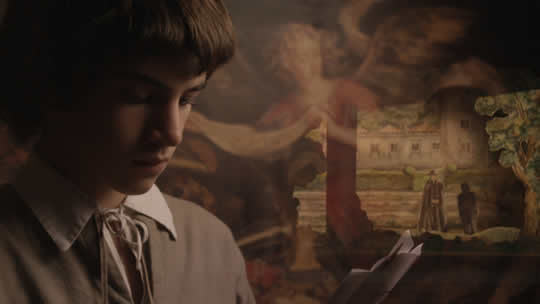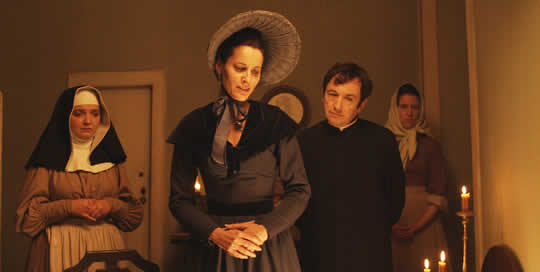 Adapted from Camilo Castelo Branco’s eponymous nineteenth-century Portuguese novel, it has the grace and leisurely pace of 18th and 19th century literature and the visual momentousness of paintings of the same period.
Adapted from Camilo Castelo Branco’s eponymous nineteenth-century Portuguese novel, it has the grace and leisurely pace of 18th and 19th century literature and the visual momentousness of paintings of the same period.
Ruiz’s fluid camera’s circular moves recall Ophuls or Renoir. Often time we watch tableau like sequences that seem to be quotes of unknown classical paintings. Characters posed in a tight doorway, behind them in deep focus are garden vistas, or sections of a ballroom, all suffused with a strange narrative tension. Sometimes the camera moves latterly, tracking from room to room and back, each time someone else is in the room we just left.
Ruiz has always jiggered with the dialectic between immersion and detachment, between modernism and the Baroque. Here Ruiz plays sudden violence against tableau like compositions to an uncanny effect. It’s as if he’s sifting the elements of melodrama through modern distancing strategies, while setting them in a classical frame.
Ruiz uses articulated Toy Theatre interstitials, which take the place of the chapter headings familiar to lovers of classical literature (i.e. ”In which our hero discovers…”etc), to move the story along.
Like Cervantes or Count Jan Potocki (the author of Saragossa Manuscript) Castelo Branco, and Ruiz dandle story within story at us, each a meditation on class, the flaws of human nature and the  failure of love.
failure of love.
As the tales gyre around their circular DNA connection, Ruiz revels in the delights of storytelling ( Not unlike Mariano Llinás’s ravishing “Extraordinary Tales.” which brought the labyrinthine tradition of telling of tales into the modern world.)
João aka Pedro da Silva (João Arrais then José Afonso Pimentel) the illegitimate child of an ill-fated romance between two aristocrats who are forbidden to marry, spends decades trying to discover who he is.
The gifted ward of kindly Father Dinis (Adriano Luz) and his sister, the nun Dona Antónia (Vânia Rodrigues), meets then reunites with his tragically abused mother, the Countess Ângela de Lima (Maria João Bastos) only to lose her to the cruel social hypocrisies of the era.
The story (or stories) span three decades and two continents: forced marriages, tragic duels, withdrawals to convents, and winding through it all, like a magic trick, the loyal, artfully disguised Father Dimas, whose constant intercessions in the name of the boy and his parents gives shape to the unfolding tragedy. Dimas (a sort of Freemason ex-machina) seems bent on his own redemption as well.
Ricardo Pereira plays the mysterious mercenary turned industrialist Knife Eater/Alberto de Magalhaes, whose own transformation and redemption at the hand of Dimas sets him on another ironic Judaslike trajectory.
 Other ill fated romances are produced, seemingly randomly, yet, in the end, they all lead to our hero’s doorstep. It’s best to leave the onion of the story tightly wrapped, You will have 4 hours to absorb the lace of ironies on display.
Other ill fated romances are produced, seemingly randomly, yet, in the end, they all lead to our hero’s doorstep. It’s best to leave the onion of the story tightly wrapped, You will have 4 hours to absorb the lace of ironies on display.
Carlos Saboga sussurent Portuguese dialogue laps hypnotically against Jorge Arriagada’s lyrical score. André Szankowski’s austere cinematography and Isabel Branco’s detailed art direction give solidity to the wandering tale. Costumer Tania Franco delights in the coquetry of fashions from the panniered courtiers of the late 1800’s through the slim Napoleonic period. The absorbing four-and-a-half-hour theatrical version of a six-hour miniseries for Portuguese television was produced by Paulo Branco, the founder of Madragoa Filmes (Portugal)
Paris-based Chilean director Ruiz, whose films rarely get an airing in the states, is known for “Time Regained,” his critically acclaimed adaptation of Proust’s Remembrances of Things Past, “Genealogies of a Crime,” both starring Catherine Deneuve, and “Three Lives and Only One Death” starring Marcello Mastroianni. He is currently filming a biopic about 20th century French author Jean Giono.

